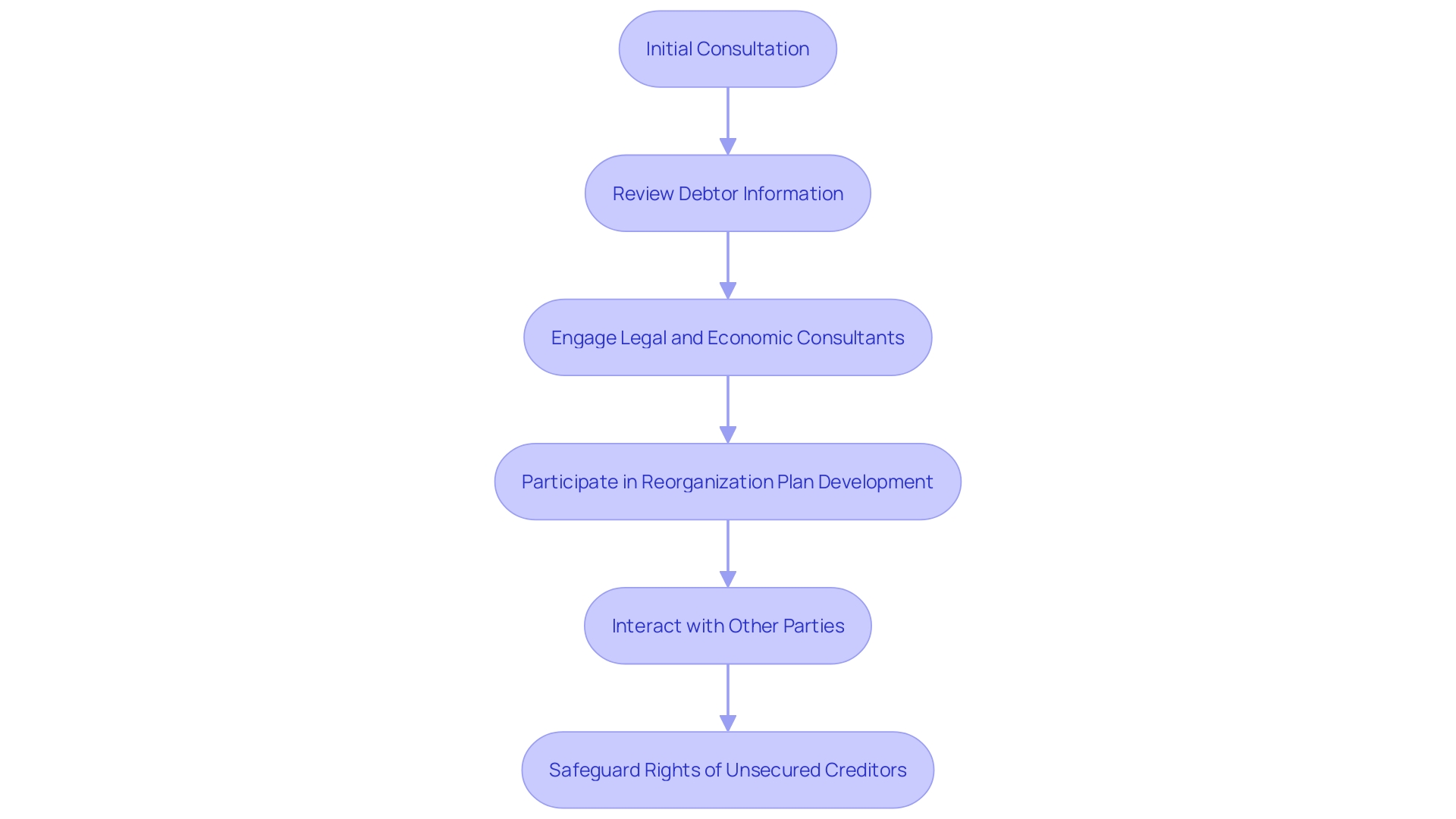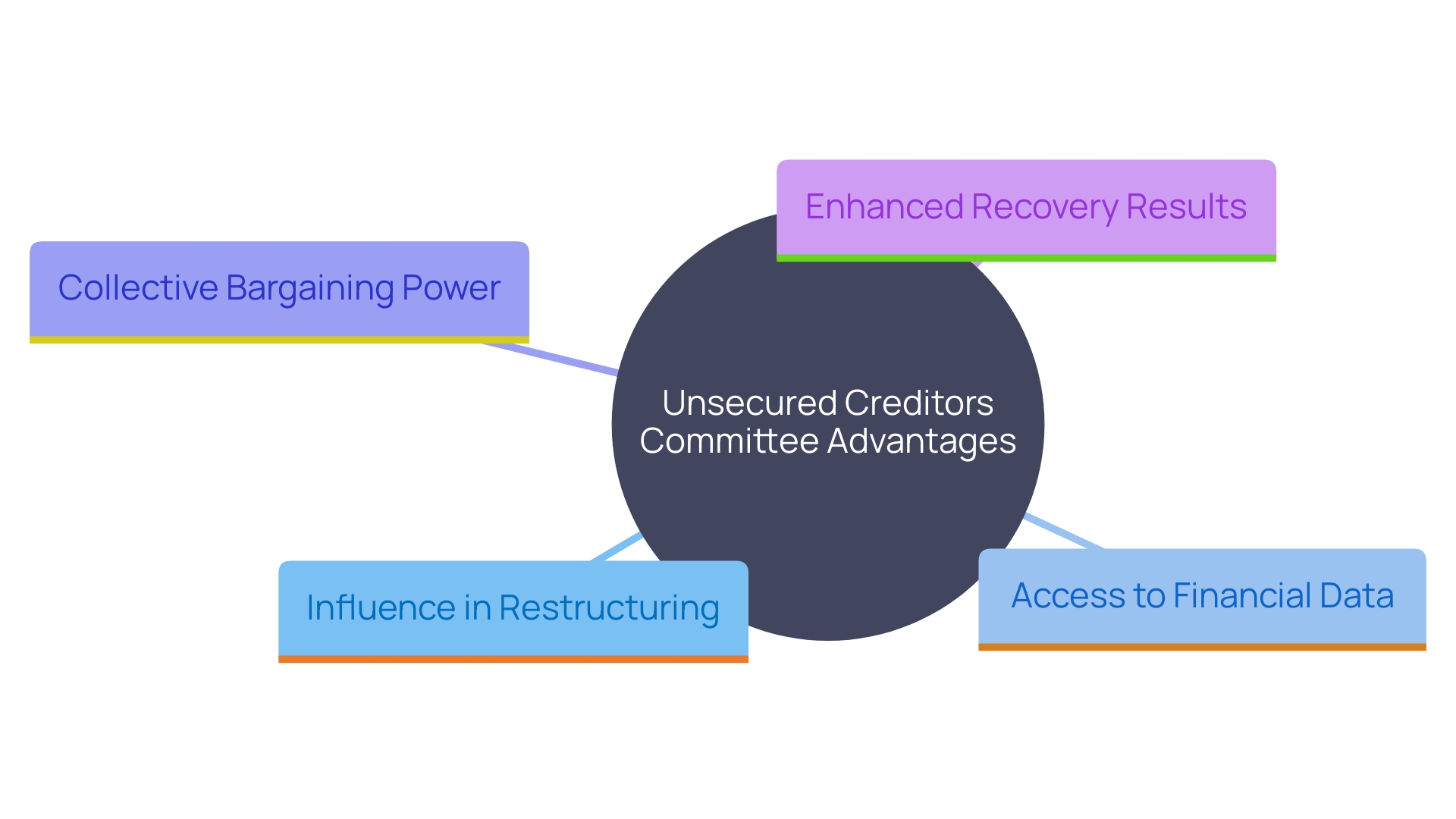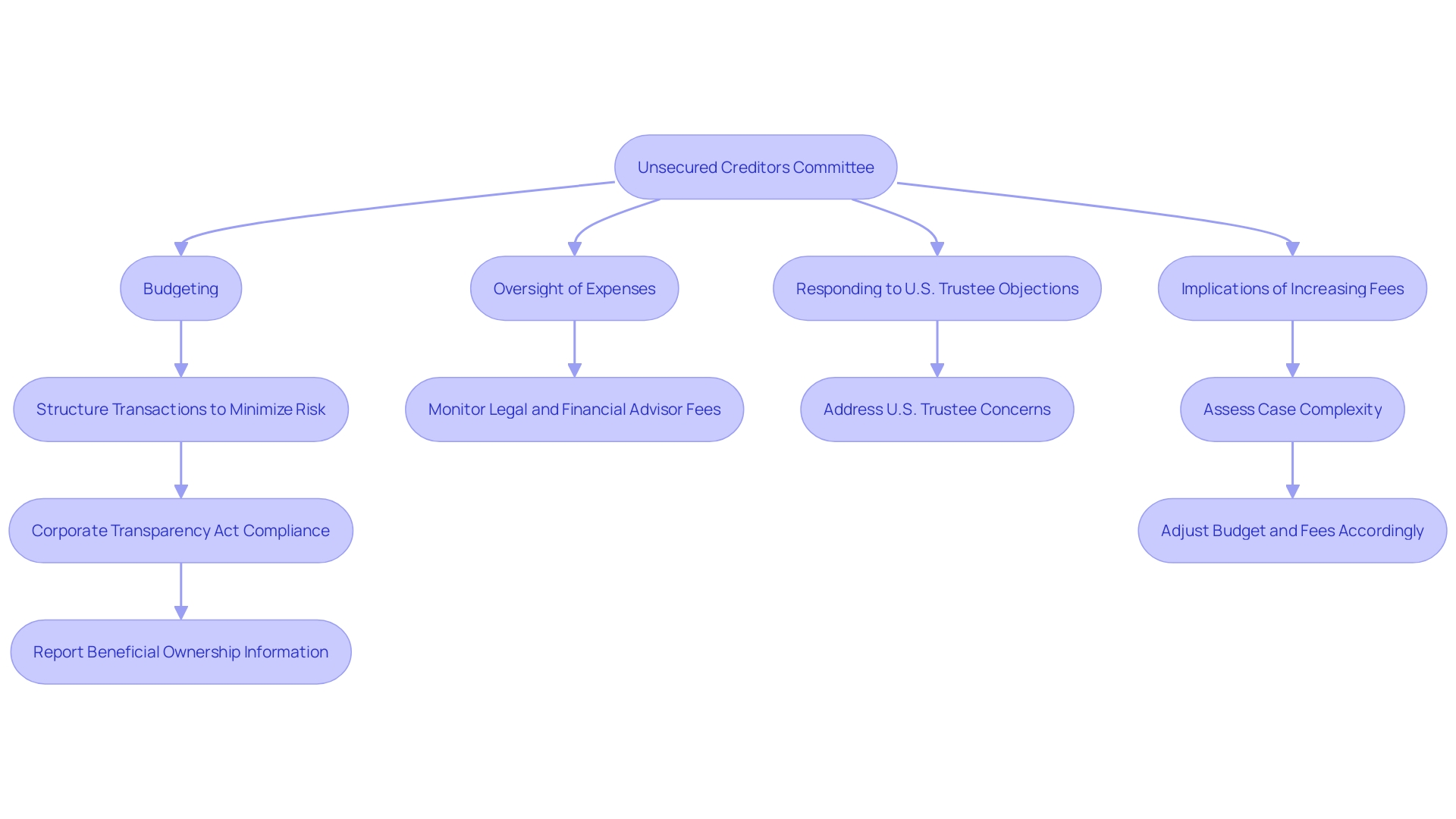Introduction
Navigating the complexities of Chapter 11 bankruptcy requires a robust and strategic approach to protect the interests of unsecured creditors. The formation of an Unsecured Creditors Committee (UCC) is a critical component in this process, ensuring that the collective voice of unsecured creditors is heard and their rights are safeguarded throughout the proceedings. Appointed by the U.S.
Trustee, the UCC typically comprises the largest unsecured creditors willing to serve, thereby amplifying their influence in negotiating the terms of reorganization plans. This committee not only represents the interests of these creditors but also provides a unified front in advocating for fair treatment and equitable recovery. As the legal landscape continues to evolve, particularly with ongoing Supreme Court deliberations, the role of UCCs remains pivotal in navigating these changes and ensuring that unsecured creditors' interests are effectively represented and protected.
Formation of an Unsecured Creditors Committee
An Unsecured Creditors Committee (UCC) is essential in Chapter 11 insolvency cases, particularly when a debtor's financial troubles affect many unsecured lenders. Founded under the U.S. Bankruptcy Code, these groups ensure that the interests of unsecured lenders are collectively represented throughout the bankruptcy process. The U.S. Trustee is responsible for appointing committee members, typically selecting the largest unsecured lenders willing to serve. The UCC's role is crucial, providing a unified voice to lenders who might otherwise lack significant influence. This collective representation can effectively advocate for the interests of lenders, negotiate the terms of the reorganization plan, and ensure a balanced approach between the debtor's restructuring efforts and the rights of those owed money. Notably, the Supreme Court's ongoing deliberations, such as in Truck Ins. Exch. 'v. Kaiser Gypsum Co., continue to shape the legal landscape, addressing issues like the right of any lender to object to Chapter 11 plans regardless of direct financial stake.'. This highlights the changing character of insolvency legislation and the essential role of UCCs in managing these intricacies to protect the interests of lenders.
Role and Responsibilities of an Unsecured Creditors Committee
The Unsecured Creditors Committee plays a critical role in bankruptcy proceedings by advocating for the interests of those who have lent money without security. This involves a thorough review of the debtor's monetary information and active participation in developing the reorganization plan. The group participates in discussions with the borrower and other parties involved to guarantee that the issues of those without secured claims are dealt with. To successfully perform these responsibilities, the group may engage legal and economic consultants, utilizing their knowledge to manage intricate insolvency procedures. This active engagement is vital in safeguarding the rights and potential recoveries of those owed money, especially in light of the increasing trends in maturity extensions, covenant holidays, missed interest payments, distressed exchanges, and bankruptcy filings. With the changing environment, the committee's role becomes even more important in safeguarding the financial interests of those without security.

Benefits of Serving on an Unsecured Creditors Committee
Joining an Unsecured Creditors Committee provides lenders with significant strategic advantages. Participation grants creditors the ability to directly influence the restructuring process, ensuring their interests are adequately represented in key decisions. Members gain access to essential monetary data and insights into the debtor's operations, enabling them to make well-informed decisions regarding their claims. Moreover, collective bargaining power is a significant advantage, enabling group members to negotiate more favorable terms for the resolution of their claims than they might accomplish alone. This collective approach is especially beneficial considering the rise in bankruptcy filings and restructurings, as observed in the greater Chapter 11 filings reported in November. Being involved in such a group enables lenders to more effectively manage the intricacies of financial hardship and enhance their recovery results.

Fiduciary Duties of Unsecured Creditors Committee Members
Members of an Unsecured Creditors Committee hold significant fiduciary duties to represent the interests of all unsecured creditors. A fundamental obligation is the duty of loyalty, which requires members to prioritize the group's and its constituents' interests above their own, avoiding any conflicts of interest and disclosing any potential conflicts that may arise. This duty is critical in maintaining the integrity of the bankruptcy process.
Additionally, committee members must fulfill the duty of care, requiring them to make well-informed decisions based on comprehensive information and thorough analysis. This duty ensures that decisions are made with the necessary diligence and attention to detail. As noted by James in his examination of recent cases, the business judgment rule protects directors' well-informed and good-faith decisions, but it does not extend to their duty of loyalty or acting in good faith.
The responsibilities of loyalty and care are vital in promoting trust and transparency within the economic sector. Maintaining these ethical standards not only safeguards the interests of creditors but also boosts the credibility and reputation of the institutions involved. As financial decisions have far-reaching consequences, maintaining high ethical principles is paramount to ensuring fair treatment and trust in the market.
Impact of Unsecured Creditors Committees on Bankruptcy Cases
Unsecured Creditors Committees play a crucial role in shaping the outcomes of bankruptcy cases. Their involvement is pivotal in negotiating terms that are more favorable for unsecured claims, ensuring that these lenders receive equitable treatment during the reorganization process. The capability of these groups to negotiate effectively can significantly improve recovery rates for creditors, as they ensure that creditor interests are well-represented and safeguarded.
The existence of an involved and committed group also encourages teamwork among stakeholders, which can speed up the insolvency procedure. This collaborative approach not only streamlines proceedings but also helps in achieving a more balanced and fair resolution for all parties involved. In recent times, we have seen an increase in defaults, maturity extensions, covenant holidays, and distressed exchanges, underscoring the importance of proactive and efficient committee involvement.
In the context of benefit corporations, trustees are required to balance the pecuniary interests against the public benefits outlined in the debtor’s articles. This includes preserving employment, protecting the environment, and supporting the local economy. Such an approach allows for a broader range of values to be pursued during the negotiation process, potentially reshaping insolvency practices to accommodate social enterprises. By promoting public-minded aims, creditors and debtors together can advocate for a vision of worth that aligns with both economic and societal objectives.
Moreover, the evolving landscape of insolvency law presents opportunities for innovative solutions, such as the introduction of 'benefit committees' which focus on public benefits alongside financial recovery. This shift towards a more inclusive and socially responsible approach to bankruptcy can lead to more sustainable and equitable outcomes, reflecting the diverse interests of all stakeholders involved.
How Unsecured Creditors Committees Influence Plan of Reorganization
Unsecured Committees play a pivotal role in shaping the plan of reorganization, providing critical input and advocating for adjustments that benefit those without secured claims. By actively participating in discussions, they influence key aspects of debt restructuring, including repayment schedules, interest rates, and the treatment of claims. Utilizing their combined power, these committees negotiate terms that improve recovery for those owed money, which can ultimately influence the practicality and approval of the reorganization plan.
A notable example of this influence is seen in the increasing use of controversial financing structures like roll-ups, where existing debt is moved to the front of the repayment line alongside new loans. This maneuver, often required by senior lenders, can restrict the choices available for lower-ranking stakeholders, but is sometimes essential to obtain the financing necessary to keep a company operational. For example, the situation of Invictus Global Management, which encountered court penalties for aggressive tactics during a Chapter 11 proceeding, highlights the complex and often contentious nature of these negotiations.
Furthermore, U.S. Bankruptcy Judge Karen Owens emphasized the difficulties that unsecured lenders encounter in maneuvering through intricate financing frameworks introduced at the onset of financial distress cases. These structures, while aimed at simplifying the debt landscape, can significantly impact unsecured creditors' recovery prospects. As insolvency filings trend higher, particularly among highly leveraged firms with minimal cash flows, the role of Unsecured Creditors Committees remains crucial in advocating for fair and equitable treatment in the reorganization process.
Financial Considerations and Professional Fees
The activities of an Unsecured Creditors Committee often involve significant financial considerations, particularly when it comes to the payment of professional fees for legal and financial advisors. These fees, which are usually paid from the debtor's estate, can significantly raise the expenses related to intricate insolvencies. For instance, in cases like the FTX bankruptcy, the complexity and emerging nature of the law can lead to higher legal fees as lawyers spend more time on the case and respond to objections from the U.S. Trustee, among other duties.
Clarity regarding these costs is essential to preserving the confidence of all lenders. As the U.S. Trustee becomes more active, the workload and consequently, the fees, for all involved lawyers tend to increase. Effective management of these costs is essential for the group to operate efficiently and advocate effectively for unsecured creditors. This necessitates careful budgeting and oversight to ensure the financial health of the committee's operations, which directly impacts its advocacy capabilities.

Conclusion
The formation and function of Unsecured Creditors Committees (UCCs) in Chapter 11 bankruptcy cases are vital for the protection and advocacy of unsecured creditors. By ensuring that the collective interests of these creditors are represented, UCCs enable a more equitable negotiation process during reorganization. The committee's ability to engage with the debtor and other stakeholders allows for a balanced approach that seeks to address the concerns of unsecured creditors while facilitating the debtor’s restructuring efforts.
The responsibilities of UCC members are extensive, encompassing the duty of loyalty and the duty of care. These fiduciary responsibilities are critical in ensuring that decisions are made transparently and ethically, thereby fostering trust among all parties involved. As the legal landscape continues to evolve, the role of UCCs becomes increasingly significant, especially in light of new precedents that challenge traditional bankruptcy practices.
The benefits of serving on a UCC are substantial. Members gain strategic advantages by influencing the restructuring process, accessing vital financial information, and leveraging collective bargaining power. This collaborative approach not only enhances the potential for better recovery outcomes but also equips creditors to navigate the complexities of financial distress more effectively.
Ultimately, the impact of UCCs on bankruptcy cases cannot be overstated. They are instrumental in negotiating favorable terms, ensuring equitable treatment for unsecured creditors, and promoting a collaborative atmosphere among stakeholders. As bankruptcy filings rise, the importance of these committees in advocating for fair treatment and optimizing recovery outcomes remains paramount, reinforcing their critical role in the evolving landscape of bankruptcy law.




